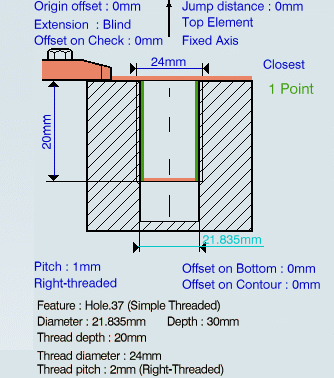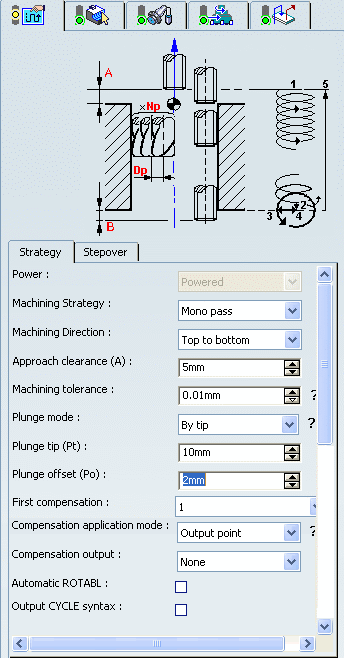Creating a Thread Milling Operation | ||||
|
| |||
Activate the Manufacturing Program and click Thread Milling
 in the Axial Machining Operations toolbar.
in the Axial Machining Operations toolbar.A Thread Milling entity is added to the Manufacturing Program. The Thread Milling dialog box appears directly at the Geometry tab
 . This tab includes a sensitive icon to
help you specify the
geometry.
Areas of the icon are colored red indicating that this
geometry is required.
. This tab includes a sensitive icon to
help you specify the
geometry.
Areas of the icon are colored red indicating that this
geometry is required.Still in the Geometry tab.
- Select the red hole depth representation then select a threaded
hole feature in the authoring window. Double-click to end your selection.
The sensitive icon is updated with the following:
- thread depth and thread diameter
- hole extension type
- thread pitch
- thread direction.
You can modify this data. Other values are shown for information only.

- Enter offset values for the Bottom and Contour, if required.
- Select the axis representation in the sensitive icon to invert the tool axis direction, if required.
- Select the red hole depth representation then select a threaded
hole feature in the authoring window. Double-click to end your selection.
Select the Strategy
 tab and set
the following parameters:
tab and set
the following parameters:- Machining Strategy: Mono pass or Optimized pass
- Machining Direction: Top to bottom or Bottom to top
- Approach clearance (A)
- Breakthrough (B)
- Machining tolerance
- Plunge mode
- Compensation number depending on those available on the tool.

Note: The figure displaying the tool path in this page is different according to the Machining strategy and Machining direction settings.
Go to the Tool tab
 to select a tool.
to select a tool.Thread mills or boring bars can be used in this type of operation.
- If you use a boring bar, machining can be done in Mono-pass machining only.
- If you use a thread mill in Optimized passes machining, the number of helical tool paths depends on the effective thread length of the tool and the thread depth of the hole.
Select the Feeds and Speeds tab
 to specify the feedrates and spindle speed parameters for the operation.
to specify the feedrates and spindle speed parameters for the operation.Note: In our example, the tool motion is at:
- Motion at machining feedrate from 1 to 2
- Motion at feedrates defined on macros from 2 to 3 and 3 to 4
- Retract at retract feedrate from 4 to 5.
Select the Macros tab
 to specify
the operation transition paths (approach and retract motion, for example).
to specify
the operation transition paths (approach and retract motion, for example).
Click Tool Path Replay
 to check the validity of the operation.
to check the validity of the operation.- The tool path is computed.
- A progress indicator is displayed.
- You can cancel the tool path computation at any moment before 100% completion.
Click OK to create the operation.
Note: If your PP table is customized with the following statement for Thread Milling operations:
CYCLE/TAP, %MFG_TOTAL_DEPTH, %MFG_FEED_MACH_VALUE, &MFG_FEED_UNIT,%MFG_CLEAR_TIP
A typical NC data output is as follows:
CYCLE/TAP, 38.500000, 500.000000, MMPM, 2.500000
The parameters available for PP word syntaxes for this type of operation are described in the NC_THREAD_MILLING section of the Manufacturing Infrastructure User's Guide.
Click Edit Cycle
 to edit or choose output syntaxes.
to edit or choose output syntaxes.